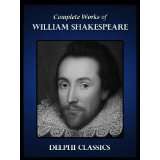
Yes, it's true. I now have five different collections of Shakespeare's work along with individual scripts of each of his plays. But I use them all and each one offers different supplemental information. My Delphi Classics version has drawn me back over and over as I research the Elizabethan period. I have it as a kindle edition, which allows me to verify authenticity of words I may use in my writing. I put in a search and can discover how many times that word is used in Shakespeare's work along with example phrases. I love it!
That said, this particular collection includes some great extras. For example, I can now access Sheakspeare's "Lost Plays" like Love's Labour's Won, Cardenio, and Double Falsehood." A "Sources" section gives me an idea of where Sheakespeare might have found inspiration for each play. Another section provides me with "The Apocryphal Plays" along with explanations for their connections to Shakespeare. Critical essays include notes from Samuel Johnson, Leo Tolstoy, Victor Hugo, and George Bernard Shaw among others. Next comes several biographies by Nicholas Rowe (Shakespeare's first "editor" who helped develop raw flios into published words in the early 17th century), Henry Norman Hudson (an American Critic from the mid 1800's), Sir Sidney Lee (an English biographer and Elizabethan scholar who wrote "Life of William Shakespeare" in 1898), Arthur Acheson ("Shakespeare's Lost Years in London), and Charles Dudley Warner ("The People for Whom Shakespeare Wrote"). The book ends with Shakespeare's Last Will and Testament and a Glossary of Elizabethan Language.
You can see why I value this book and would recommend it to anyone interested in researching Shakespeare. It's a collection of material that draws me back to discover bits of information not found in traditional biographies, along with historical insights from various period perspectives. The kindle version is a bargain at $2.99. It's reasonably formatted for electronic searches and the table of contents works very well. This book was published in 2011.
That said, this particular collection includes some great extras. For example, I can now access Sheakspeare's "Lost Plays" like Love's Labour's Won, Cardenio, and Double Falsehood." A "Sources" section gives me an idea of where Sheakespeare might have found inspiration for each play. Another section provides me with "The Apocryphal Plays" along with explanations for their connections to Shakespeare. Critical essays include notes from Samuel Johnson, Leo Tolstoy, Victor Hugo, and George Bernard Shaw among others. Next comes several biographies by Nicholas Rowe (Shakespeare's first "editor" who helped develop raw flios into published words in the early 17th century), Henry Norman Hudson (an American Critic from the mid 1800's), Sir Sidney Lee (an English biographer and Elizabethan scholar who wrote "Life of William Shakespeare" in 1898), Arthur Acheson ("Shakespeare's Lost Years in London), and Charles Dudley Warner ("The People for Whom Shakespeare Wrote"). The book ends with Shakespeare's Last Will and Testament and a Glossary of Elizabethan Language.
You can see why I value this book and would recommend it to anyone interested in researching Shakespeare. It's a collection of material that draws me back to discover bits of information not found in traditional biographies, along with historical insights from various period perspectives. The kindle version is a bargain at $2.99. It's reasonably formatted for electronic searches and the table of contents works very well. This book was published in 2011.

 RSS Feed
RSS Feed
